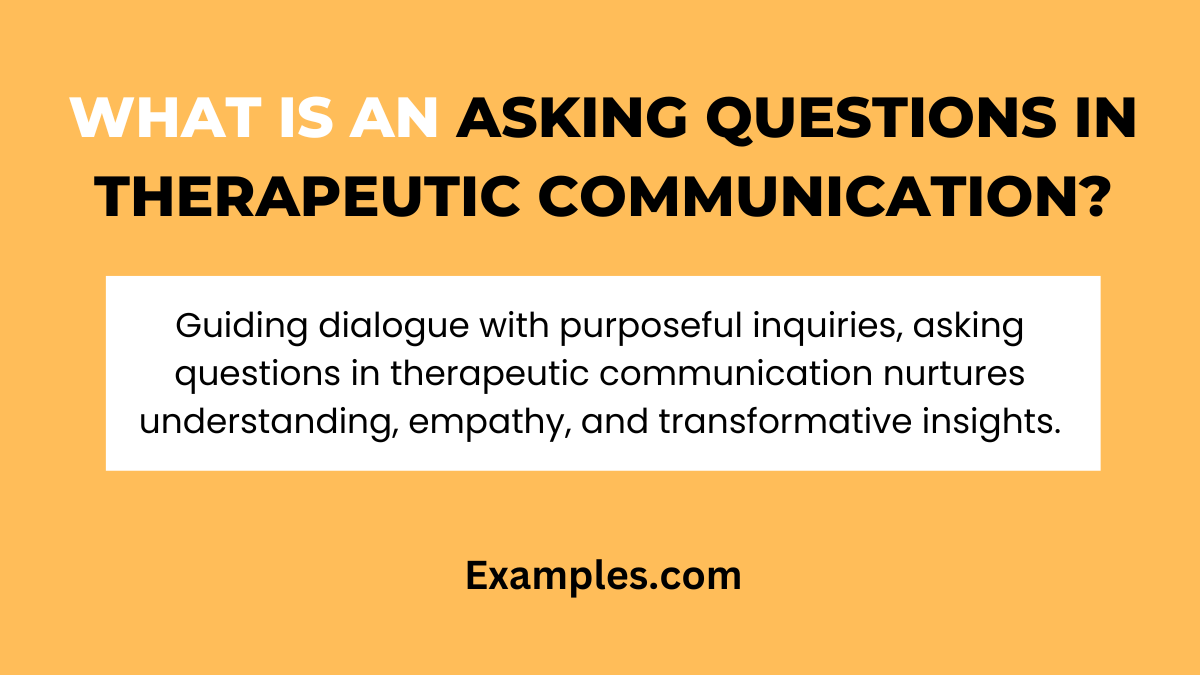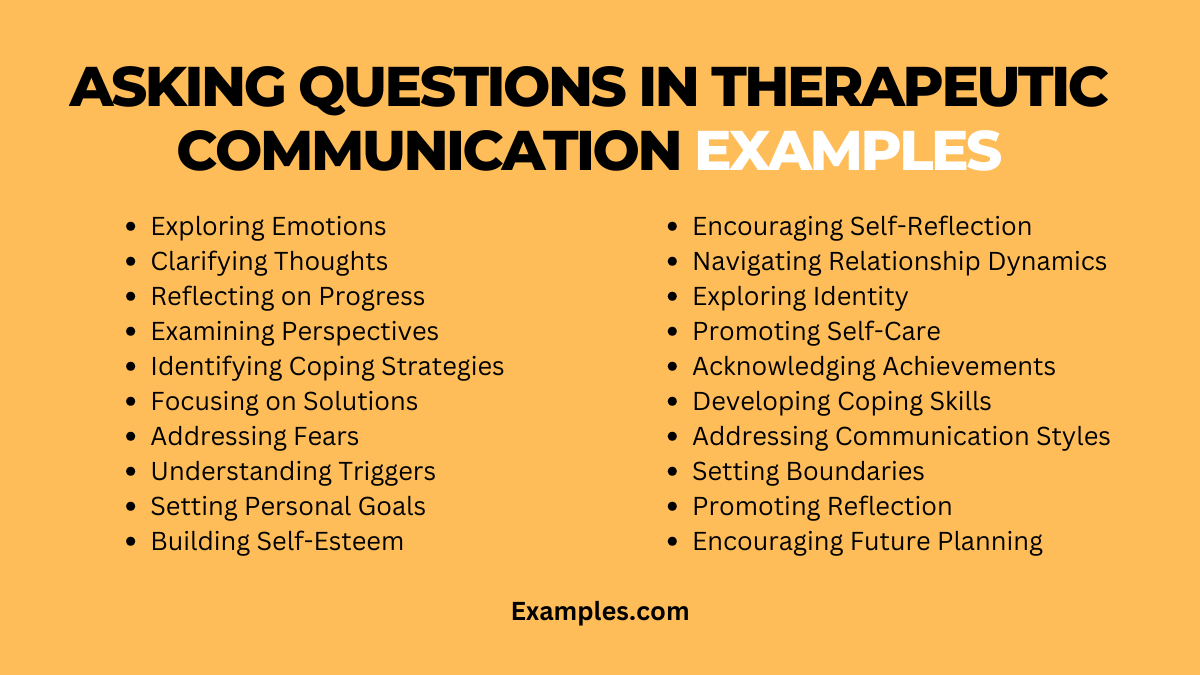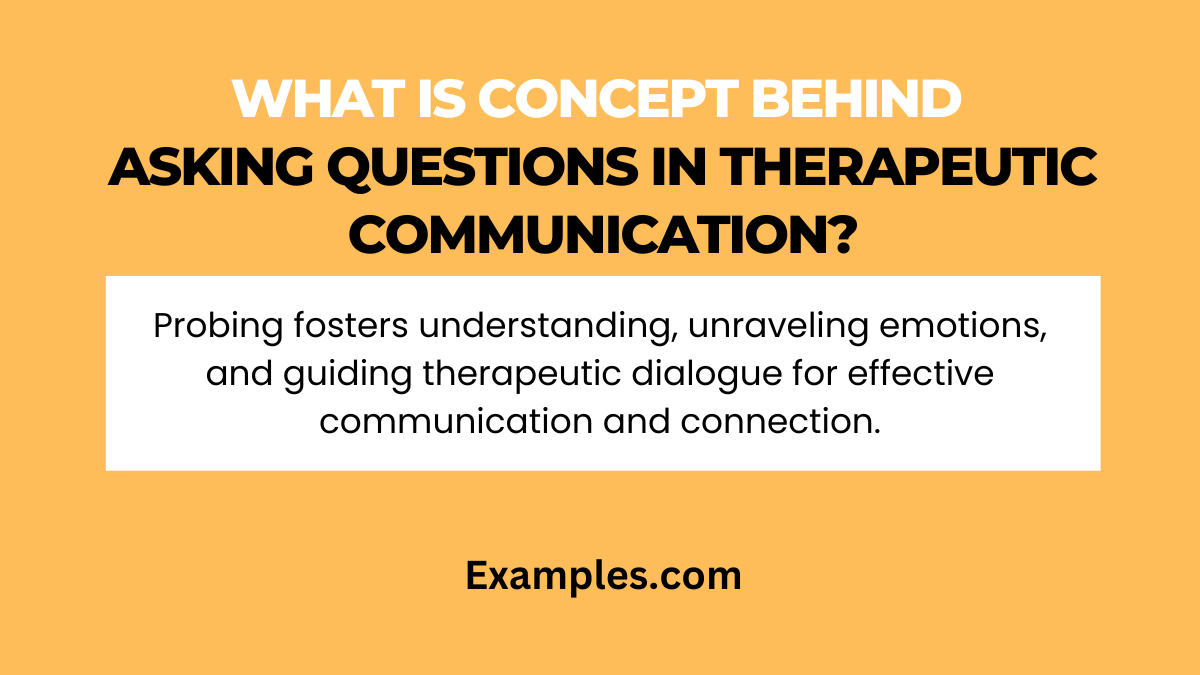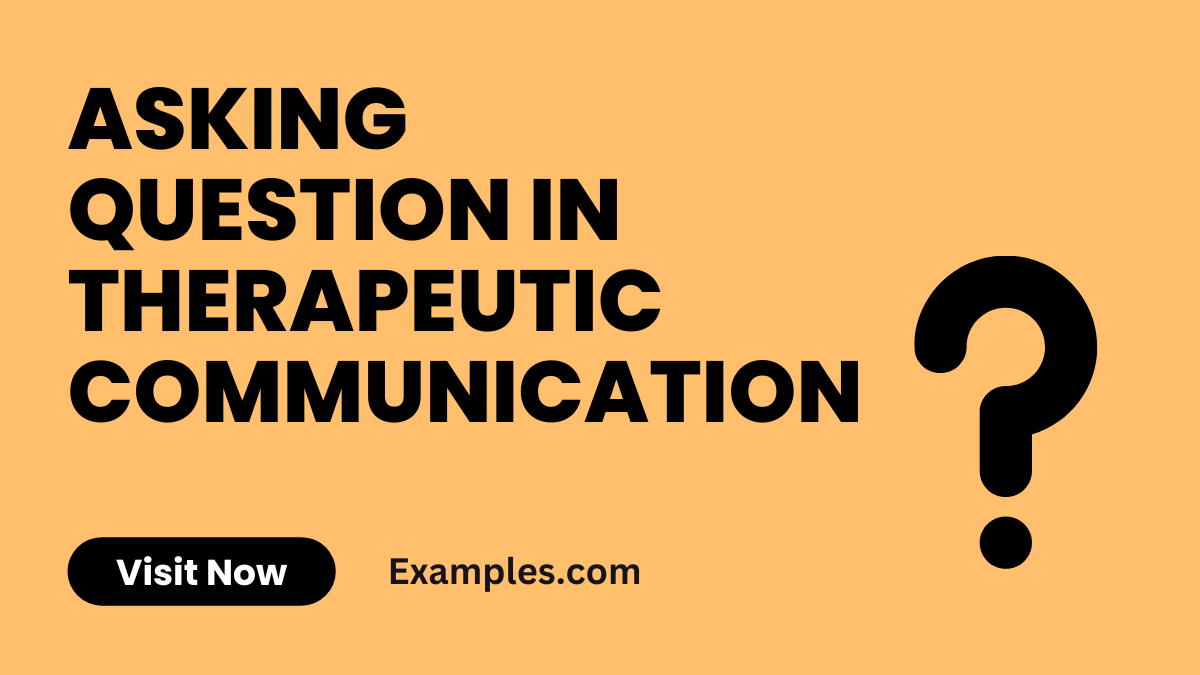19+ Asking Questions in Therapeutic Communication Examples
Embark on a transformative journey of therapeutic communication with our comprehensive guide on Asking Questions. Dive deep into nuanced techniques and explore real-world Communication Examples. Elevate your interpersonal skills, fostering a healing environment. Uncover the art of thoughtful inquiry, complemented by expert insights, to enrich your therapeutic practice. From crafting impactful questions to navigating responses, this guide empowers you to master the vital skill of questioning in therapeutic communication.
What is an Asking Questions in Therapeutic Communication?

An “Asking Question” in therapeutic communication refers to the intentional and compassionate use of queries to explore emotions, thoughts, and experiences, promoting understanding and enhancing the therapeutic relationship. This technique involves skillful questioning to encourage self-reflection and expression within a supportive and non-judgmental space.
20 Asking Questions in Therapeutic Communication Examples

Engaging in therapeutic dialogue involves artful questioning, fostering deeper connection and insight. Skillfully posed questions elicit meaningful responses, paving the way for exploration and understanding.
- Exploring Emotions: “How do you feel about recent challenges? Let’s navigate these emotions together.”
- Clarifying Thoughts: “Can you share more about your concerns? This helps us pinpoint areas for growth.”
- Reflecting on Progress: “What achievements are you proud of? Reflecting on progress can boost motivation.”
- Examining Perspectives: “How do you view this situation? Understanding diverse perspectives enhances our dialogue.”
- Identifying Coping Strategies: “What coping mechanisms work for you? Let’s explore strategies for managing stress.”
- Focusing on Solutions: “How can we work towards solutions? Let’s collaborate on actionable steps.”
- Addressing Fears: “What specific fears do you have? Acknowledging fears is a crucial step in overcoming them.”
- Understanding Triggers: “Can you identify triggers? Recognizing them aids in developing effective coping strategies.”
- Setting Personal Goals: “What goals resonate with you? Let’s establish a roadmap for your personal growth.”
- Building Self-Esteem: “What strengths do you possess? Celebrating strengths contributes to building self-esteem.”
- Encouraging Self-Reflection: “How do you perceive your progress? Self-reflection enhances awareness and growth.”
- Navigating Relationship Dynamics: “What dynamics are challenging in relationships? Identifying issues is the first step towards improvement.”
- Exploring Identity: “Can you share aspects of your identity? Embracing identity fosters self-acceptance and understanding.”
- Promoting Self-Care: “What self-care practices resonate with you? Prioritizing self-care is vital for well-being.”
- Acknowledging Achievements: “What milestones have you reached? Celebrating achievements is integral to the therapeutic journey.”
- Developing Coping Skills: “How do you typically cope with stress? Let’s explore and enhance your coping toolbox.”
- Addressing Communication Styles: “How do you prefer to communicate? Understanding styles aids in effective interactions.”
- Setting Boundaries: “What boundaries feel important? Establishing clear boundaries ensures a healthy therapeutic relationship.”
- Promoting Reflection: “Can you reflect on recent experiences? Reflection fosters insight and facilitates personal growth.”
- Encouraging Future Planning: “What aspirations drive you? Planning for the future instills a sense of purpose and direction.”
Asking Questions in Therapeutic Communication Examples for Nurses
For nurses, adept questioning is a cornerstone of patient care. Thoughtful queries can uncover vital information, enhance understanding, and foster a supportive therapeutic environment.
- Eliciting Pain Information: “Can you describe the pain? Pinpointing details aids in tailored pain management strategies.”
- Understanding Medication Concerns: “Are there worries about medications? Addressing concerns ensures adherence and well-being.”
- Exploring Emotional Responses: “How do you feel about the diagnosis? Acknowledging emotions initiates empathetic care and support.”
- Assessing Coping Mechanisms: “What coping methods do you rely on? Understanding coping strategies informs holistic patient care.”
- Encouraging Self-Care Practices: “What self-care activities resonate with you? Promoting self-care aligns with overall patient well-being.”
Asking Questions in Therapeutic Communication Examples for Interviews
In interviews, strategic questioning is a powerful tool. It aids in understanding perspectives, assessing qualifications, and establishing effective communication within professional settings.
- Exploring Leadership Styles: “How do you approach leadership? Understanding styles ensures alignment with organizational values.”
- Clarifying Work Challenges: “Can you share past challenges? Identifying challenges gauges problem-solving skills and adaptability.”
- Assessing Goal Alignment: “What career goals resonate with you? Aligning goals enhances long-term commitment and motivation.”
- Understanding Conflict Resolution: “How do you handle conflicts? Assessing conflict resolution skills is crucial for team dynamics.”
- Exploring Professional Development: “What learning opportunities interest you? Evaluating interests aligns with continuous professional growth.”
What is the Focus of Asking Questions in Therapeutic Communication?
In therapeutic communication, the focus of asking questions is centered on eliciting meaningful responses, fostering understanding, and building rapport. By strategically framing questions, practitioners guide conversations towards relevant topics, allowing clients to express thoughts and emotions openly. This focus facilitates a client-centered approach, where the individual feels heard and valued, enhancing the overall therapeutic experience.
- Identify Communication Goals: Determine the specific goals or information needed from the client to guide the questioning process.
- Tailor Questions to the Individual: Craft questions that consider the unique experiences, concerns, and preferences of the client.
- Create an Open and Non-Judgmental Environment: Ensure a safe space where clients feel comfortable sharing their thoughts and emotions without fear of judgment.
- Use Reflective and Clarifying Questions: Employ reflective questions to delve deeper into emotions and clarifying questions to ensure accurate understanding.
- Adapt Questioning to Client’s Pace: Adjust the pace of questioning to match the client’s comfort level, allowing for thoughtful responses.
- Promote Active Listening: Listen attentively to responses, using the information to guide subsequent questions and show genuine interest.
- Respect Silence and Processing Time: Allow clients time to process questions, respecting moments of silence that contribute to thoughtful responses.
- Encourage Client Autonomy: Frame questions in a way that empowers clients to explore their thoughts, fostering a sense of autonomy in the therapeutic process.
What is the Concept Behind Asking Questions in Therapeutic Communication?

In therapeutic communication, asking questions serves as a fundamental tool to deepen understanding, foster dialogue, and elicit valuable information from clients. The concept revolves around promoting self-reflection, encouraging expression of thoughts and feelings, and empowering individuals to explore their experiences. Thoughtful questioning helps therapists gather insights, identify patterns, and collaboratively navigate the therapeutic process. It’s a means to uncover underlying emotions, thoughts, and concerns, facilitating a holistic and client-centered approach to healing and personal growth.
What is the Importance of Asking Questions in Therapeutic Communication?
Asking questions holds paramount importance in therapeutic communication, serving as a conduit for exploration, understanding, and collaborative problem-solving. The significance lies in its ability to deepen the therapeutic relationship, empower clients in their journey, and facilitate targeted interventions that contribute to emotional well-being.
- Enhances Active Engagement: Asking questions actively engages clients in the therapeutic process, promoting their involvement and investment in the dialogue.
- Fosters Client-Centered Care: Prioritizes the client’s perspective, allowing them to direct the conversation and express concerns, contributing to a client-centered approach.
- Identifies Underlying Issues: Questions unveil underlying emotions, thoughts, and experiences, aiding in the identification of core issues and challenges.
- Promotes Emotional Expression: Encourages clients to express and articulate their emotions, fostering emotional catharsis and self-awareness.
- Strengthens Therapeutic Alliance: The interactive nature of questioning strengthens the therapeutic alliance, building trust and rapport between the practitioner and client.
- Guides Treatment Planning: Information gathered through questions guides the formulation of effective treatment plans, ensuring interventions align with client needs.
- Encourages Problem-Solving: Questions contribute to collaborative problem-solving, empowering clients to explore solutions and coping strategies.
- Facilitates Goal Achievement: Aligning questions with therapeutic goals ensures that conversations contribute directly to the achievement of desired outcomes and milestones.
In conclusion, the art of asking questions in therapeutic communication transcends mere inquiry; it forms the essence of empathetic dialogue. By skillfully posing inquiries, practitioners unlock profound insights, nurture client autonomy, and fortify therapeutic bonds. This comprehensive guide illuminates the significance, techniques, and applications, empowering practitioners to navigate diverse scenarios with precision, fostering meaningful connections and transformative outcomes.



